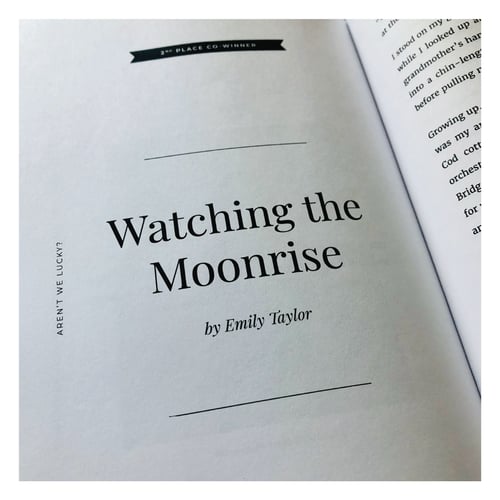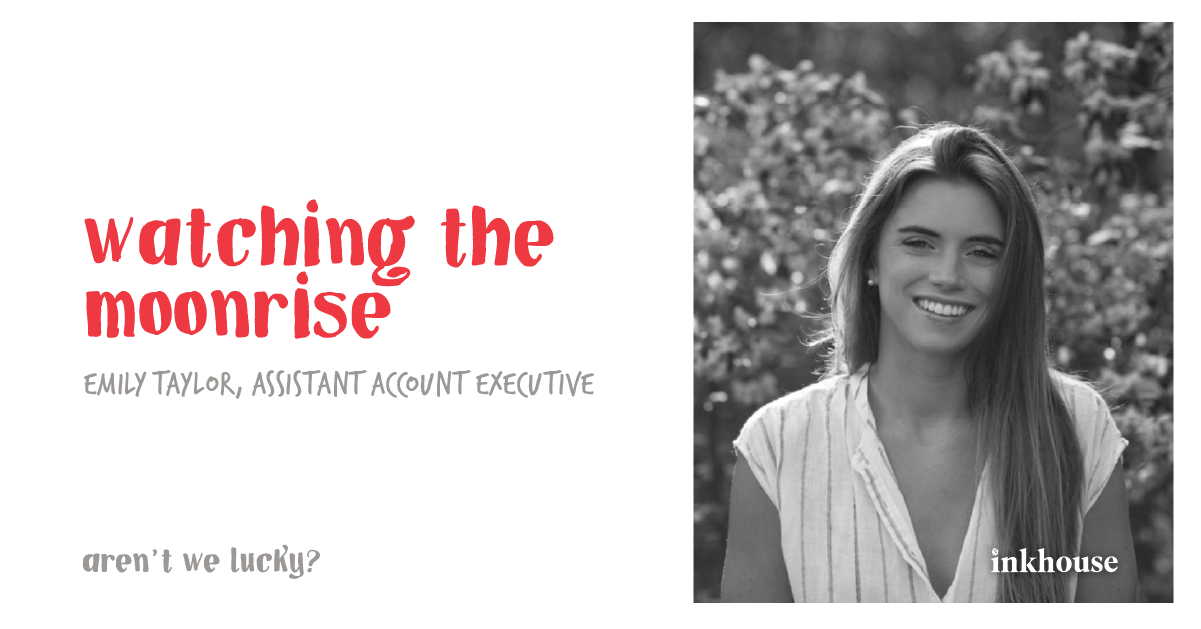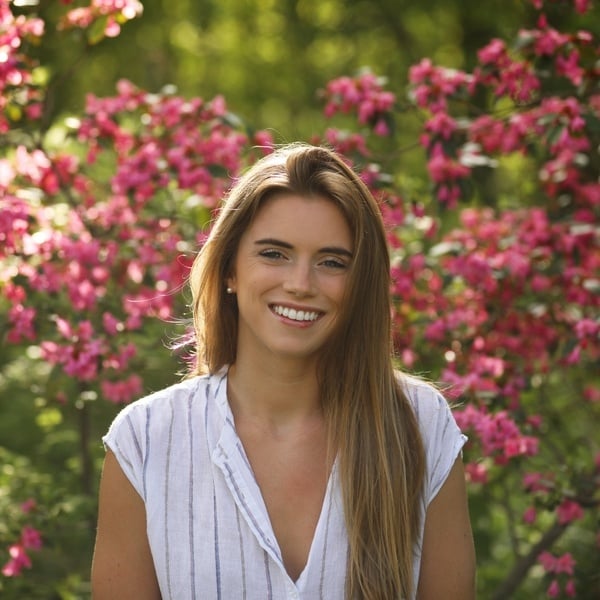Watching the Moonrise: Second Place Essay in "Aren't We Lucky?"
Nov 04, 2021 Emily Taylor
“When you miss me, look up at the moon. We’re always looking at the same moon.”
I stood on my grandparents’ deck, blinking tears from my eyes while I looked up at the blurred, bright moon. I still feel my grandmother’s hand brushing the hair off my face, freshly cut into a chin-length bob as it was during each summer visit, before pulling me in with a squeeze.
 Growing up, I was a homebody almost to a fault. One exception was my annual solo summer trip to my grandparents’ Cape Cod cottage. My parents would drive me halfway for an orchestrated handoff at a rest stop just before the Bourne Bridge. My heart rate would rise as I scanned the parking lot for my grandparents’ green minivan. It was like my excitement and fear were in a heated poker game and neither would fold.
Growing up, I was a homebody almost to a fault. One exception was my annual solo summer trip to my grandparents’ Cape Cod cottage. My parents would drive me halfway for an orchestrated handoff at a rest stop just before the Bourne Bridge. My heart rate would rise as I scanned the parking lot for my grandparents’ green minivan. It was like my excitement and fear were in a heated poker game and neither would fold.
By the time we pulled off the sand road into their gravel driveway, my grandmother would have me laughing breathlessly. When we were together, the world was funny. The world was light. It didn’t matter what we were talking about—she would ask me about friends or summer camp or the song on the radio, and before I knew it, her laughter was echoing throughout the car. Then I’d be laughing. Then my grandfather. At that point, all hope of composing ourselves was lost.
I carried my stuffed canvas tote to the back bedroom on the first floor. But I always ended up on a plush comforter at the foot of the master bed upstairs, forgoing the distance of even one flight of stairs..png?width=500&name=Artboard%209%20(2).png) Each summer, I spent every second of the visit soaking up the time with my grandmother. We had our traditions: my midsummer haircut, getting to the beach before the ice cream truck, movie nights, and watching critters off the back deck. One year, we went back-to-school shopping and I came home with my first and only rolling backpack. We would have fashion shows and create imaginary worlds. But more than anything, we laughed.
Each summer, I spent every second of the visit soaking up the time with my grandmother. We had our traditions: my midsummer haircut, getting to the beach before the ice cream truck, movie nights, and watching critters off the back deck. One year, we went back-to-school shopping and I came home with my first and only rolling backpack. We would have fashion shows and create imaginary worlds. But more than anything, we laughed.
Even now, I feel laughter bubbling up in me when I think of her giggle, which would turn into a full-blown laughing fit, ending with her wiping a tear from her face and my cheeks aching. We always believed that laughter makes you live longer, so we thought we would live forever.
She reminded me to look to the moon as each summer visit wound down and what I can describe only as withdrawals set in. I spent the first few nights home crying on the phone to her, unable to fill the hole that was left after a week of undivided time together.
Alone and lonely are vastly different states of being. When I was younger, physically alone meant lonely. I would bring my baby sister to my room with me so I would have company. Eventually, I realized that being alone didn’t mean I was lonely. I can feel empty in a room full of people but entirely whole on my own.
There are a select few people in my life who make it impossible to feel lonely, even when I’m not with them. Their existence in my life is enough. My grandmother is one of them. These are the people whom I can be completely myself around and who love me unconditionally, in a way that’s impossible to doubt. It reminds me of the way I love the ocean. I am drawn to it when the sun rises on its still, glassy surface, but when the sky breaks out in anger and the glass shatters, throwing waves toward shore, I still stare in awe. I don’t judge the ocean for how calm or rough it is. It’s not a matter of good or bad, just different states of being.
In 2020, being alone was no longer a choice but an order. The line between lonely and alone blurred that year, as days drifted into weeks into months. I moved back in with my family—an experience that I would describe with words ranging from “exasperating” to “blessed.”
We created countless new traditions out of nothing to break up the monotony of drifting from one room of the house to another. On one cool August night, we put on our most tropical-themed outfits and drank rum punch on the porch for a makeshift Caribbean vacation. Constantly surrounded by my parents and siblings, I didn’t feel acutely lonely. But I still longed for the uninhibited interactions with friends, extended family, and strangers that the world had to give up.
We visited my grandparents on Cape Cod in mid-July. The back bedroom and my grandparents’ bedroom floor remained empty. We rented the house next door and never went within six feet of them while we sat on the back deck.
We talked; we tried to laugh. My grandmother had been in and out of the hospital recently, and this was the first time I struggled to find the woman who had spent hours designing an elaborate lottery dream house with me. I reminded her of the golf carts we planned to drive around the property and the room that would rotate with the sun so we would always see it rise and set. Her witty eyes and ceaseless laugh were harder to find, but memories brought them back.
We waved from a distance, repeating how we couldn’t wait to embrace each other once this was all over.
About a month later, my grandmother’s health continued to deteriorate. I struggled to know what to do, separated more by the pandemic than distance. Our last goodbye weighed on us when we hugged my grandfather at my grandmother’s memorial two months later.
When my grandmother passed away, I wrote, “When I think about it, I start to fall apart. Maybe I fall apart because of all the parts of me she composed. The pieces cry out for their origin. The memories crumble out of their boxes, pulled like magnets. Maybe I fall apart because a piece of me is leaving with her. And I don’t know how to say goodbye. And I don’t even get to try.”
When you lose someone you love, you lose someone who loved you.
My trips to Cape Cod became more sporadic as I got older. But my grandmother never stopped making the world feel less lonely. I remember calling her one fall afternoon while walking back from class during my junior year of college. We hadn’t talked in longer than l should have waited to call, but it felt the same as the nights she pulled me close under the summer moonlight. I stopped to sit on a cool rock wall, telling her every detail about the first weeks of school, not once worrying that she didn’t care or would rather be doing something else.
As time passes, I try to embody more of what she taught me and who she was. I occasionally take on a WWND (What would Nana do?) mindset, and I think she must be chuckling somewhere at the thought of that. It’s not that she gave me detailed guidelines for how to live a good life. Instead, I think of the stories she told, the way she carried herself, and our constant laughter. This slowly eases the loneliness that seeps in when I remember she is no longer a phone call away.
Whenever you miss me, she said,
look up at the moon.
We are always looking at the same moon.
I wonder, when I look up now,
Where will you be?
No longer standing against the wood-fenced deck,
dewy wine glass in hand,
smelling sweet and warm.
No longer leaning back, laughing with the summer air.
I wonder where you will be.
But I will always look up at the moon
and think of you.
And pray that you are looking too.
This essay co-won second place in our 2021 employee writing contest and appears in our book, Aren’t We Lucky? Stories of Resilience from the Inkhouse Community. Download your copy here.






